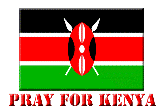I spoke to the folks and friends this weekend, and they are in better spirits. I was told that Kenyans were wishing each other Happy New Year on Saturday, as the New Year had begun on Friday. I had a laugh with my folks about this.Apparently, it was bustling in town yesterday.
I just finished a piece of consultancy work with a Somali organisation here in the diaspora, and some of the people I worked with are Kenyan Somalis. There was definitely a different vibe on Friday,hope in the air with people now ready to fly home soon.
The President's Party of National Unity, which has a coalition arrangement with Mr Musyoka's ODM-Kenya, holds its PG tomorrow. Raila's Orange Democratic Movement meets on Wednesday.
The agenda for both sides will be the forging of a common stand on the proposed National Reconciliation Act 2008, which is an offshoot of the deal Raila and Kibaki signed.ODM will be holding a PG on Wednesday where they will formally take a common stand on the accord," Raila said on Saturday, after meeting Annan.With the signs it is just a matter of time before Kibaki and Raila become the pilot and co-pilot of aircraft Kenya, attention is now shifting to two former friends-turned- foes.
It is slightly over five years after necessity pushed them into a historic union that changed the politics of Kenya and defeated Kanu before parting ways in 2005.
The one-time liberation comrades when the nation cried for unity to defeat Kanu began to fall out soon after they took power in 2003, mainly over dishonoured Memorandum of Understanding.That journey will begin in real, concrete terms if Parliament, which convenes this week, ratifies the agreements the two leaders agreed on Thursday.
Unlike in 2002 when removing Kanu from power was seen to be good enough, Raila, Prime Minister-designate, and Kibaki, the President, have a daunting task.
The deal Raila and Kibaki signed last week, charges them with joint responsibility on issues they have viewed differently.
It charges both to preside over the overhaul of the Kenyatta State, which President Kibaki was seen to be reproducing and the Moi structures, which he fought briefly then embraced for political survival.
For Raila, it is a moment to dismantle what he has always wanted to; the leftovers of Kenyatta and Moi States, which he says have been characterised by gross inequalities and concentration of power and public resources, especially land, in the hands of a power elite. These are views for which he spent long years in detention, fighting.
Raila and Kibaki, despite radical differences in their political worldviews, cut the image of the last of the fading generation of politicians who still have some sense of ideology in politics.
A look into their politics over the years reveals an impression that Kibaki appears to believe that the way out of the problems that bedevil Kenya lies in the economy.
For Kibaki, from his early days in the Cabinet, through his days as DP chairman, all the way to his first term as president, he appears to believe that a strong and growing economy would heal the wounds and rifts in Kenya.
On the other hand, Raila's journey in politics leaves behind a strong impression that he believes the country's problems begin with the Constitution and its governance structures.
Raila appears to believe that however much the economy grows, if the country does not have a constitution and governance structures that define equal access to wealth and how power is used, national challenges will persist.
In contrast, Raila's campaign manifesto began with the promise of a new constitution. His party said it would guarantee a new constitution within six months to ensure equity, executive accountability and devolution of power.
Raila also promised a parliamentary system of government "where power will be shared and not concentrated in one person or office."
Those are just a few of the differences the two will have to integrate as they begin work in a new coalition.
They will also be required to address historical injustices, past cases of impunity, and secure national healing and reconciliation.
Kofi Annan has left Kenya now, I am so grateful to him for facilitating this deal; he has insisted Kenyans must still respect the rule of law while a final polical solution is sought.
I have had a numerous hits on my blog the past two days from readers looking for stories on Martha Rarua(tear apart) Karua aka PNU hardliner.
I guess it is to do with the stories circulating, that it is her heated exchanges, that led to the suspension of the talks on Tuesday.
Some readers have asked for a transcript of that event, unfortunately, I have no access to that information.
The healing that needs to be done from now on, is huge, the internally displaced need to be resettled, to restore peace.
Related articles: Torturous road that led to a power deal.





No comments:
Post a Comment